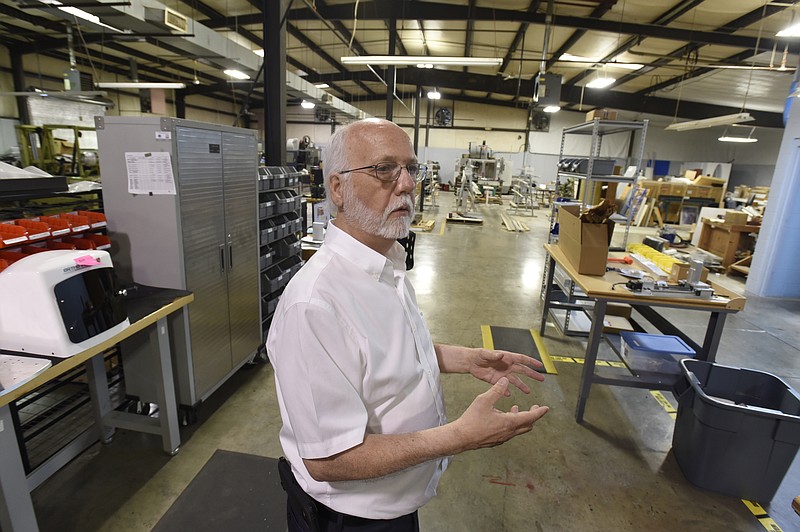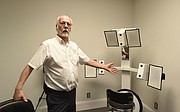If we had some money to work with, we'd be dangerous.
A client with crooked teeth can show up at an orthodontist's office at 9 a.m., get a high-tech exam and walk out the door 90 minutes later wearing a set of "invisible" plastic braces, known as aligners, churned out by a 3D printer.
That's the promise of a longtime - yet little-known - Chattanooga business that builds a system of software, a facial scanner and a 3D printer that lets an orthodontist size up a patient's mouth, straighten a virtual version of their crooked teeth on the computer and then print out a set of aligners that progressively fix the client's teeth.
"Our [system] will straighten the teeth in incremental steps," said Dan Knoch, who founded iPrint 3D. "A lot of what we do has never been done before. We have had many firsts in the orthodontic field."
Knoch hopes to raise iPrint 3D's first-ever infusion of outside cash to produce more of the 3D printers that they think will be a game-changer in the industry.
"If we had some money to work with, we'd be dangerous," Knoch said. "What we need is to take us to the next level."
Knoch already has sold about 60 of the 3D printers, which retail for $24,700 and save orthodontists about $1,100 per client, the company says - resulting in a $60,000 annual revenue increase for the average orthodontist.
Patients like the iPrint 3D system partly because of the "gee-whiz" factor. And company officials say, because the technology shortens the length of time the that they need to wear braces.
"That's a really, really big thing," Knoch said.
Took part in Gigtank 365
Angela Otero, the president of iPrint 3D, took part in the Gigtank 365 "accelerator" for startup businesses and sought funding at the Gigtank July 28 Pitch Night event at the Edney Building in downtown's Innovation District.
"We learned a lot from it, and I think it helped us to prepare for talking to investors," Knoch said of the Gigtank experience.
To help grow the business, iPrint 3D is seeking its first-ever outside infusion of cash.
"They're a really interesting company," said Tia Capps, spokeswoman for the nonprofit Co.Lab organization that runs the Gigtank 365 accelerator. Capps recently toured iPrint 3D's headquarters in an office park on Kanasita Road in the Hixson/Middle Valley area.
"I consider myself a potential customer," said Capps, who has thought about getting braces and likes the iPrint 3D's promise of straightening teeth fast.
The 3D printing business is the latest incarnation of a software business that Knoch launched in 1981, when he used the CPM operating system, the precursor for Microsoft's DOS, to build a program that let orthodontists import and store X-rays of patients' faces.
In the years since, Knoch has adopted ever-more-sophisticated technology - building 3D printers, scanners and software in-house - to fulfill his vision of straightening peoples' teeth.
"All I was doing was trying to solve orthodontic problems," Knoch said.
Software written in sealed-off room
The 20,000-square-foot building where the business is headquartered has computer numerical control (CNC) milling machines, a tech support team that fields calls from around the world - and an "authorized personnel only" room where engineers with master's and doctoral degrees write code behind closed doors.
"Actually, the software is the most complex part of anything that we make," Knoch said.
Knoch's business has patents, but the trouble with that, he said, is patents require companies to document each step of the process, which can let competitors know what you're doing. So instead of seeking patents, Knoch's software engineers work away from prying eyes in the sealed-off room and produce software innovations before competitors can catch up.
One of the firm's engineer's research on 3D body scanning has been cited about 500 times in professional literature, Knoch said.
"One of the things he did is make software that can capture a 3D image. We can actually measure the face," he said. "We have our software in about 70 percent of the universities in the United States that have orthodontics."
Harvard's orthdontics department recently launched a joint research project that uses Knoch's facial scanning and facial analysis software.
"Harvard University doesn't just work with anybody," said Slyvia Knoch, Dan's wife and business partner.
Seeking angel investor
The Knoch's iPrint 3D business has five employees, and Knoch would like to add about seven to 10 more employees to increase production of 3D printers and help fund the company's marketing and operations.
"What would be ideal is to have an angel investor, or three or four of them," Knoch said. "We're confident that they'll make 10 to 20 times return on the money."
The Knochs have talked with Ira Weiss, co-founder of The Startup Box Group, a Hixson-based group consulting firm, to help them find funding.
"They've already sold over $1 million in product," said Weiss. "This is a growth company; this isn't a startup."
Contact staff writer Tim Omarzu at tomarzu@timesfreepress.com or www.facebook.com/MeetsForBusiness or twitter.com/meetforbusiness or 423-757-6651.

